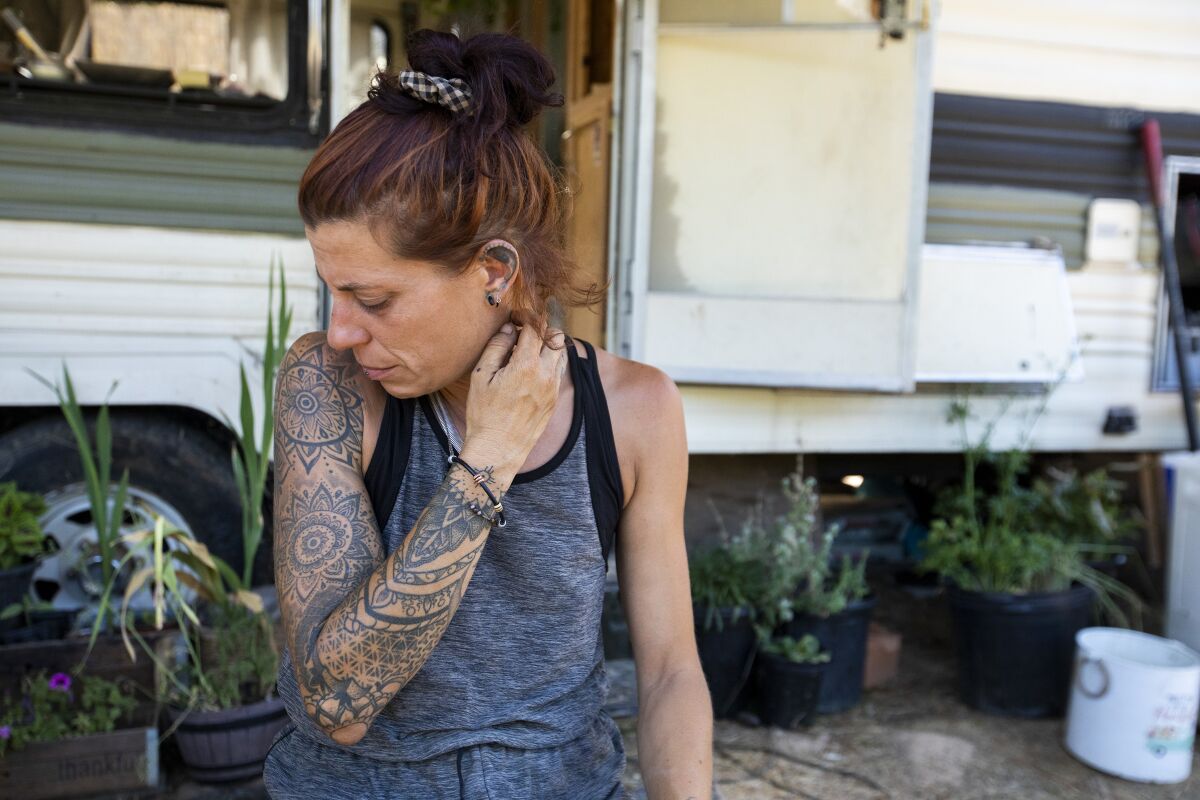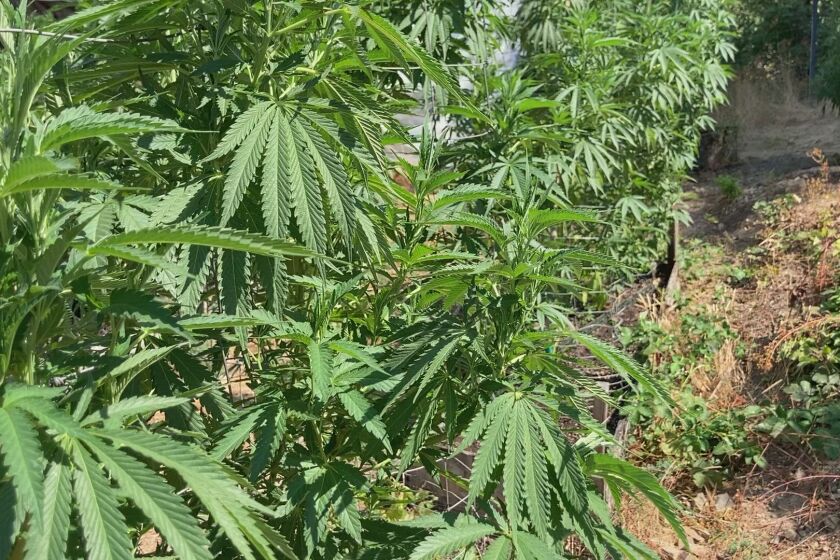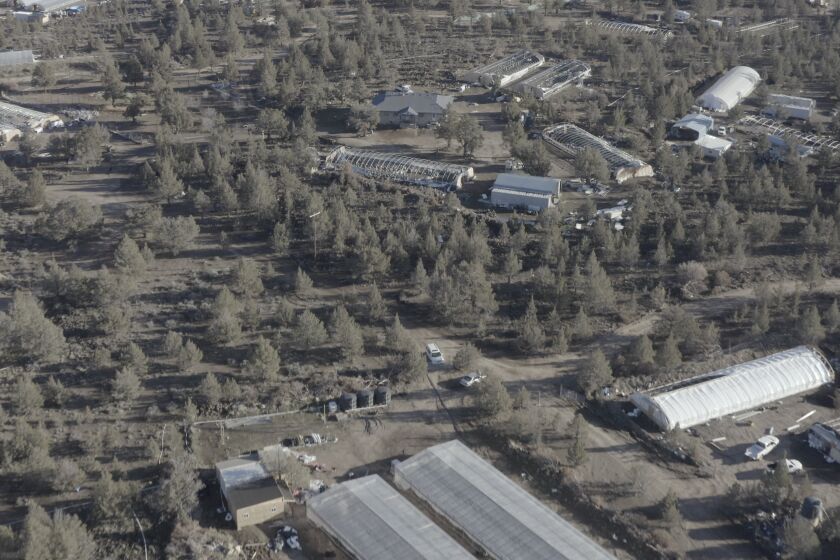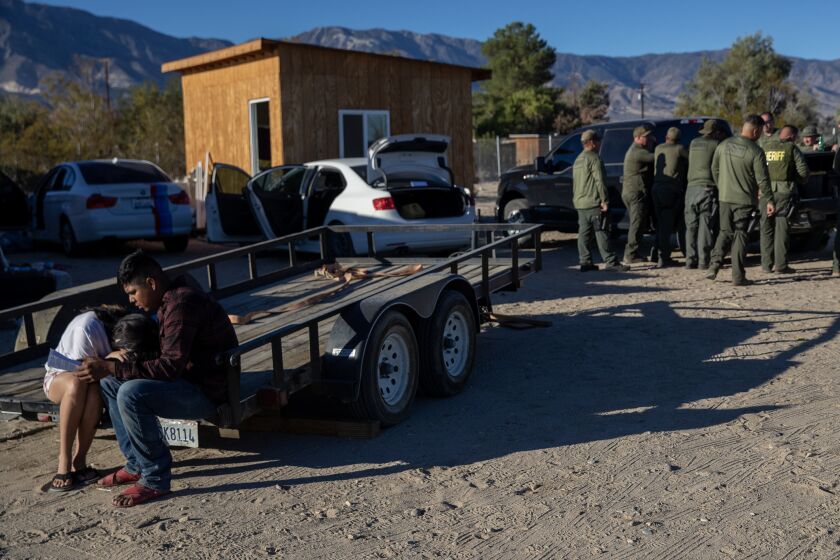Lawmakers want investigation, hearings into ‘Wild West’ of California cannabis and farm work

BY PAIGE ST. JOHN,
JAN. 29, 2023 5 AM PT
California lawmakers are calling for a sweeping investigation into corruption in the state’s cannabis industry, legislative hearings on the exploitation of farmworkers and new laws to thwart labor trafficking in response to revelations of rampant abuses and worker deaths in a multibillion-dollar market that has become increasingly unmanageable.
The proposals follow a series of Times investigations last year showing that California’s 2016 legalization of recreational cannabis spurred political corruption, explosive growth in illegal cultivation and widespread exploitation of workers. The Times found that wage theft was rampant and that many workers were subjected to squalid, sometimes lethal conditions.
A spokesperson for the state’s Department of Industrial Relations told The Times last week that the agency is examining the deaths of 32 cannabis farmworkers — never reported to work safety regulators — uncovered by the newspaper.

CALIFORNIA Legal Weed, Broken Promises: A Times series on the fallout of legal pot in California Dec. 29, 2022
“We should be a little bit ashamed that we’ve allowed this helter-skelter approach to commercializing and legalizing the cannabis industry,” said Sen. Dave Cortese, a San Jose Democrat who leads the Senate Labor Committee. Cortese called California’s cannabis market the “Wild, Wild West.”
Cortese and Senate Agriculture Committee Chair Melissa Hurtado (D-Sanger) said they are discussing an agenda for legislative hearings this spring on the plight of workers on all types of California farms. But they said the abuse and exploitation chronicled in The Times’ investigation, “Legal Weed, Broken Promises,” highlights the hazards for those who labor in cannabis fields.
Assemblymember Blanca Rubio (D-Baldwin Park) said she intends to resurrect legislation to fight labor trafficking that was vetoed by Gov. Gavin Newsom and to include a mechanism to ensure that the state Department of Cannabis Control acts on evidence of such crimes. The Times found that the agency failed to respond to worker complaints and even to abuses uncovered by its own staff.
Assembly Labor Committee Chair Ash Kalra (D-San Jose) told The Times it is important to act now, before labor abuses become standard practice in the emergent legal cannabis industry.

CALIFORNIA The reality of legal weed in California: Huge illegal grows, violence, worker exploitation and deaths Sept. 8, 2022
The Assembly’s Public Safety Committee chairman, Reggie Jones-Sawyer (D-Los Angeles), has declared himself the state’s “cannabis cop.” He has vowed to tackle failures highlighted by the newspaper’s reporting, including farmworker fatalities and exploitation and the corruption that plagues cannabis business licensing at the city and county levels.
“People dying from harvesting or processing cannabis — it’s just outrageous,” Jones-Sawyer said.
He said he would seek a state investigation into licensing corruption, particularly in areas highlighted by The Times.
“It’s very important to me that we finally get a grip on this and start to crack down,” he said.
None of the inquiries are guaranteed to happen. A corruption investigation would need approval from the Legislature’s audit committee, which next meets in March. Likewise, legislative hearings on farmworker conditions have yet to be presented to Senate leadership for discussion.
A spokeswoman for California’s central Labor & Workforce Development Agency said its labor safety branch was “assessing” cannabis worker deaths reported by The Times “to determine whether they have jurisdiction in each of the incidents reported.”
The newspaper found that California’s dual state and local cannabis licensing system created fertile ground for corruption by giving thousands of often part-time, low-paid municipal officials the power
to choose winners and losers in the multimillion-dollar deals.
Local politicians held hidden financial ties to cannabis businesses even as they regulated the industry. Consultants and elected officials told of backroom lobbying and solicitations for cash — while criminal investigations were isolated and scrutiny was sporadic.
A lawmaker in October called for state Atty. Gen. Rob Bonta to form a task force that would target corruption in cannabis licensing but received no reply. Bonta’s office told The Times such action would be the responsibility of the state cannabis department.
Lawmakers taking up these measures said they are particularly sensitized to the treatment of farmworkers. Hurtado is the daughter of immigrant agricultural workers. Rubio’s parents first came to California as part of a federal migrant worker program, then returned without documentation because, as she said, “we still had to eat.”

CALIFORNIA FOR SUBSCRIBERS Dying for your high: The untold exploitation and misery in America’s weed industry Dec. 22, 2022
Some lawmakers, including Hurtado and Rubio, said the state set up its cannabis market without addressing the labor-intensive crop’s reliance on easily exploited immigrant workers. For some industries — garment factories and car washes, for example — the state set up special enforcement programs and created funds to compensate exploited workers, but this has not been done for cannabis or agriculture in general.
“It’s the Wild, Wild West in terms of the lack of any uniform scheme [on] how we deal with this industry,” Cortese said.
Lawmakers and labor advocates said farmworkers were given little thought during behind-the-scenes negotiations for legalization. In a deal cut with labor unions, the law contained just two provisions that in reality have offered little protection: requiring large farms to give union access to workers and requiring all license holders with two or more employees to have at least two people receive generic workplace safety training.
Labor advocates told The Times they tried to warn the state about the potential for worker exploitation as the commercial cannabis market was being structured.
Because cannabis remains illegal under federal law, labor advocates in 2017 sent letters to those crafting regulation noting that workers would be unlikely to benefit from federal labor protections, putting the onus for their safety on the state.

CALIFORNIA Inside California’s pot legalization failures: Corporate influence, ignored warnings Sept. 22, 2022
“Lawmakers aren’t really aware of the problem. It’s shameful that they’re not,” said Christopher Sanchez, policy advocate for the Western Center on Law & Poverty. He said The Times’ reporting “just highlights a lot of the fears that a lot of us had.”
UCLA labor researcher Robert Chlala said legalization attracted investors who borrowed business models from the agricultural industry — a sector notorious for wage theft and abuse.
“We are just transferring what we haven’t fixed yet in our agricultural system” to cannabis, he said. “What we haven’t done yet to protect the people who make the food for this country.”
The Times investigation documented accusations of exploitation against more than 200 cannabis operations — more than half of those licensed by the state.
Workers told reporters of bosses who threatened them with guns or physical violence, of living on remote work sites without housing or sanitary facilities or access to food, and of fraudulent promises of pay. In some cases, they said, bosses threatened to report them to immigration authorities or withhold their wages if they tried to leave.
Fraud and coercion are elements of labor trafficking, a felony offense in California. A series of 2020 reports by California’s independent government watch group, the Little Hoover Commission, faulted the state for failing to have clear labor trafficking laws and for lacking a single agency responsible for prosecution.
Newsom has rejected the Legislature’s keystone bills to curtail the crime.
In 2019, he vetoed a bill to gather data on labor trafficking because it wasn’t introduced as part of the budget. In September 2022, he vetoed a bill to police foreign labor recruiters, echoing the same objections raised by the Chamber of Commerce and agriculture industry lobbyists.
Last fall, he rejected a unanimously passed, unopposed bill to create a labor trafficking crime unit within the state’s labor department, saying he would prefer to see trafficking complaints heard by the California Civil Rights Department, which seeks civil remedies, so that victims “are not further victimized by the prosecutorial process.”
Newsom’s press office did not respond directly to a request for comment on The Times’ findings of cannabis labor exploitation and deaths but released a statement criticizing federal immigration policy.
“Strengthening our efforts to enforce workplace standards will continue to be a priority, but it is not sufficient, especially for this vulnerable population,” the statement said. “Congress needs to get up the courage to bring our country’s immigration — and cannabis — policies into the 21st century.”
Newsom’s office issued much the same statement a day later in response to the killings of seven people Monday on produce farms in Half Moon Bay.
Assemblymember Joaquin Arambula, a Fresno Democrat who sponsored the ill-fated legislation to create a labor trafficking unit, told The Times he intends to push again this year for a criminal investigation unit within the labor department. “I believe we need a single entity that can help us to prosecute and then prevent labor trafficking in the future,” Arambula said.
Sheriffs confronted with cannabis workers living in squalor, without food, pay or the ability to leave, said they lack local resources to address the problem. They said the number of workers at risk is huge: The state has tens of thousands of illegal cannabis farms spread across vast remote regions, and even licensed farms are not closely watched.
“There used to be some state support,” Trinity County Sheriff Tim Saxon said, adding that the support focused on ripping out illegally grown plants, not on addressing exploitation of cannabis workers.
Saxon said he is reliant on private outside funding to investigate cases of human trafficking.
The Times investigation found little outreach to apprise cannabis workers of their rights. Those workers who knew to complain of wage theft to the California labor agency waited as long as two years for a decision, even after telling the state that their lives had been threatened. Lawmakers told The Times the labor department suffers from chronic staffing shortages, failing to fill already funded positions.
The Times investigation also found that some workers sought the help of the Department of Cannabis Control, unaware that the agency, despite having sworn law enforcement officers, had no process for handling labor abuses discovered by staff. The department did not respond to Times questions over the course of three weeks on its policies for handling allegations of labor trafficking.
Rubio said she is negotiating with Newsom’s administration and Bonta’s office to create a state government position for the express purpose of ensuring that cannabis labor complaints get forwarded to the right agency. She also is considering taking up the labor trafficking bills that were vetoed by Newsom.
She said it is “stunning” that lawmakers have paid so little heed to the impact of cannabis legalization on farmworkers, a group she and others said lacks strong political representation, despite California’s legacy as the birthplace of the farmworkers’ rights movement half a century ago.
“For my colleagues not to even be looking at it is … shocking to me,” Rubio said. “So instead of pointing fingers, my commitment is to work with the governor’s office and work with the departments to make something that is doable.”
https://www.latimes.com/california/story/2023-01-29/lawmakers-want-investigation-hearings-into-the-wild-wild-west-of-california-cannabis-and-farm-work

Recent Comments